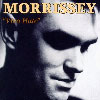MORRISSEY : VIVA HATE
- Alsatian Cousin
- Little Man, What Now?
- Everyday Is Like Sunday
- Bengali In Platforms
- Angel, Angel, Down We Go Together
- Late Night, Maudlin Street
- Suedehead
- Break Up The Family
- The Ordinary Boys
- I Don't Mind If You Forget Me
- Dial-A-Cliché
- Margaret on the Guillotine
Label : His Master's Voice
Release Year : 1988
Length : 42:16
Review (AllMusic) : Following the breakup of the Smiths, Morrissey needed to prove that he was a viable artist without Johnny Marr, and Viva Hate fulfilled that goal with grace. Working with producer Stephen Street and guitarist Vini Reilly (of the Durutti Column), Morrissey doesn't drastically depart from the sound of Strangeways, Here We Come, offering a selection of 12 jangling guitar pop sounds. One major concession is the presence of synthesizers - which is ironic, considering the Smiths' adamant opposition to keyboards - but neither the sound, nor Morrissey's wit, is diluted. And while the music is occasionally pedestrian, Morrissey compensates with a superb batch of lyrics, ranging from his conventional despair ("Little Man, What Now?," "I Don't Mind If You Forget Me") to the savage political tirade of "Margaret on a Guillotine." Nevertheless, the two masterstrokes on the album - the gorgeous "Everyday Is Like Sunday" and the infectious "Suedehead" - were previously singles, and both are on the compilation Bona Drag.
Review (Wikipedia) : Viva Hate is Morrissey's debut solo album, released on 14 March 1988 by HMV Records. The album was considered a very strong foray into Morrissey's solo career, as he utilised his traditional lyrical style and retained the basic sound that The Smiths had developed by the time they broke up. It was listed by Q as one of the top 50 albums of 1988. The album was originally going to be called Education in Reverse; some LPs in Australia and New Zealand were released with the original title. The album was released a mere six months after The Smiths' final album, Strangeways, Here We Come. The title predicts the content as Morrissey's lyrics are sardonic and invective, while some of the tracks deal with the harshness of the breakup of The Smiths. The album was produced by Stephen Street and most of the arrangements were by Vini Reilly of The Durutti Column. Reilly's distinctive style is evident throughout the entire album, especially in tracks such as "Late Night, Maudlin Street" and "Bengali in Platforms". The record remains one of Morrissey's best known recordings and was certified Gold by the RIAA on 16 November 1993. Some of the tracks caused controversy such as the track "Margaret on the Guillotine", which described the death of prime minister Margaret Thatcher as a "wonderful dream". The American release included the track "Hairdresser on Fire" which had been released, in the UK as a B-side to "Suedehead". This same track was released on a 7" single that was sold with the album in Japan.
